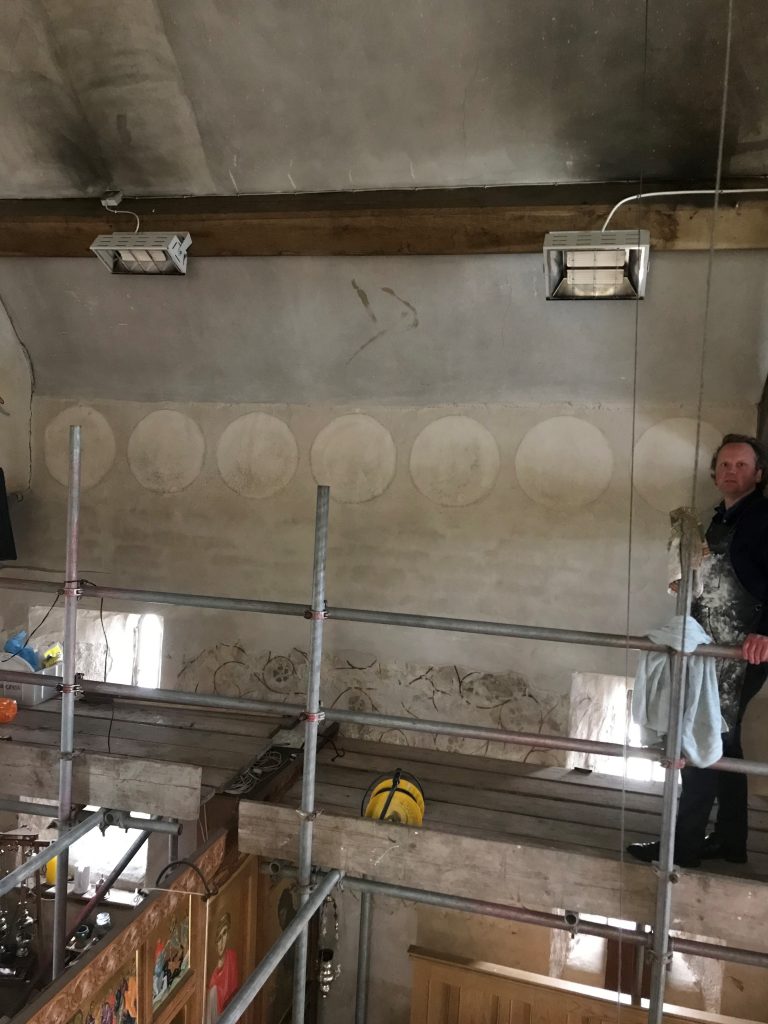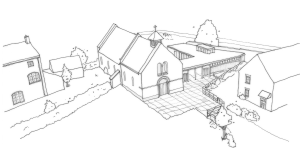
A Crimean Archbishop, two Roman Empresses, a Syrian monk, an Anglo-Saxon hermit, a Galilean fisherman, a Cypriot Shepherd. These are just a few of the saints that will soon be painted on the walls of the Greek Orthodox Church of the Holy Fathers of Nicaea, Shrewsbury.
The scaffolding is up, the walls are prepared and painting is soon to begin on the internal north and south walls of this historic, Grade II* Listed church. Aidan Hart, world renowned iconographer, said today “I will be tracing the designs on to the walls and tomorrow then I can begin the actual painting.” The painting is due to be completed in time for the church’s greatest feast: Pascha.
The church is small. It was therefore very difficult to make a decision about which of the many thousands of saints should be the first to be painted on the walls of the church. The selection however was a collective one with input from the whole community. The selection wonderfully reflects the diversity of our church community. Our church is home to people from every corner of the Orthodox World as well as British who have found a new home in Orthodoxy. It is fitting that the church should now be home to an equally diverse selection of Saints.
Support this project
Completing the iconography in the church is an ongoing project. We will be continuing to paint icons in the church as is fitting for Orthodox worship over a number of years. The visitor to an Orthodox church, on stepping inside, should ideally feel transported into a new world, one that affirms in the most forceful way that the beauty of God’s creation is a manifestation of His glory and His love for mankind. The iconography that traditionally adorns the interior of an Orthodox church plays a major role in this affirmation.
We are deeply grateful for the donations we have received towards the project so far. If you would like to help there are still opportunities to contribute. Please visit our donations page which provides details of how to give.
The Saints
This is the full list of saints:
Apostles and Equal to the Apostles
Andrew the Apostle († 60) called first by Christ. Commemorated 30 November.
Constantine the Great († 337), proclaimed Emperor in York. He also legalised Christianity in the Roman Empire in the Edict of Milan. He called the First Œcumenical council in 325. Commemorated 21 May.
Eleni († 330), his mother and Empress, who discovered the True Cross in Jerusalem. Commemorated 21 May.
The Samaritan Woman, Photini († 62), who famously confronted Christ on matters of worship at Jacob’s well. Commemorated on March 20 (also commemorated on February 26 & the “Sunday of the Samaritan Woman”).
Thekla († 70) Companion of St Paul, first woman martyr and equal to the apostles who died in Syria. Commemorated on September 24.
Great Hierarchs and Ecumenical Teachers
Spyridon († 348), shepherd of Cyprus, who witnessed to the two natures of Christ at the First Ecumenical Council by bringing forth fire and water from a tile. To this day he wears out his slippers walking around the streets of Corfu. Commemorated on December 12.
Cuthbert († 687), enlightener of northern England and wonderworker who was called out of the life of a hermit by the king of Northemberland for archpastoral duties. He was consecrated by Theodore of Tarsus. He led his diocese by caring for the sick, distributing alms, working the many miracles that earned him the title of Wonder-worker of Britain. Commemorated on March 20.
Luke of Simferopol († 1961) in the Crimea a physician and Archbishop. An outstanding surgeon who suffered persecution under the Bolshevik regime and is now an amazing wonderworker. Commemorated on 11 June.
Chad of Lichfield († 672), the first bishop of Mercia whose great missionary work is immortalised in the place name in our own county of Shropshire. Commemorated on 2 March.
Martyrs
Katherine of Alexandria († 303), who defeated 50 of Emperor Maxentius’s philosophers in open debate on the truth of Christianity and was subsequently cruelly tortured and put to death. Commemorated on 25 November.
Marina († 303), of Antioch disowned by her father for accepting the Christian Faith, resisted the advances of the governor Olymbrios and then suffered horrific martyrdom for refusing to renounce Christ. Commemorated 17 July.
Alban († 254), soldier and first martyr of Britain, who gave himself up for martyrdom in place of a priest who he sheltered from persecution.
Elizabeth († 1919), princess of Russian and granddaughter of Queen Victoria who left the imperial court to become a nun, founding the Marfo-Mariinsky Convent dedicated to helping the downtrodden of Moscow and was later martyred by the Bolsheviks. Commemorated on 18 July.
Oswald of Northumbria († 642) who was killed by the Mercians at the Battle of Maserfield, in Oswestry in Shropshire named after Oswalds Tree where a raven dropped the arm of his dismembered body. Commemorated 5 August.
God-bearers
John of Damascus († 760) – Church Father, the most important systematic Theologian of the Orthodox. Commemorated 4 December.
Theodora († 856), the empress, who ended the the iconoclasm. The proclamation of 843 restoring veneration of icons initiated the feast of the Triumph of Orthodoxy that has since been celebrated by the Orthodox Church each year on the first Sunday of Lent. Commemorated 11 February.
Werburga († 700), of Chester, who devoted her life to overseeing many monastic communities in Mercia and founding new religious houses including those
at Trentham, Hanbury and Weedon. Commemorated 3 February
Kassiani (†9th Century) Nun, poetess and magnificent Hymnographer. Commemorated 7 September.

Dcn Panteleimon
- Positive Pre-application response to Church Extension Project
 Shropshire Council and Historic England have responded positively to a pre-application submission by the Community Board for the church extension. In Autumn 2022, the Community board engaged Shropshire Council and Historic England in pre-application discussions concerning a proposed extension to the church. Pre-application discussions are informal and are held ahead of a full planning and
Shropshire Council and Historic England have responded positively to a pre-application submission by the Community Board for the church extension. In Autumn 2022, the Community board engaged Shropshire Council and Historic England in pre-application discussions concerning a proposed extension to the church. Pre-application discussions are informal and are held ahead of a full planning and